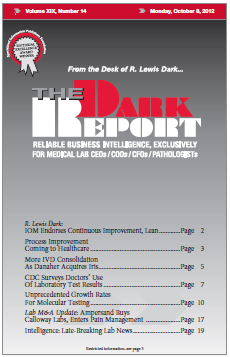CEO SUMMARY: One new byword coming to healthcare in the United States is the “continuously-learning healthcare system.” At the upcoming Lab Quality Confab in San Antonio next month, lab managers and pathologists can learn more about how to achieve and sustain continuous improvement in their laboratory organization. Pathologists and lab managers who have been active …
Process Improvement Coming to Healthcare Read More »
To access this post, you must purchase The Dark Report.


